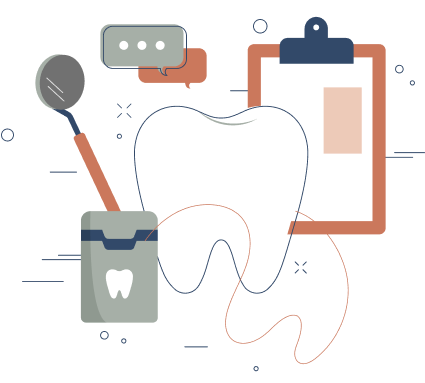Extractions
A tooth or teeth are extracted for many reasons. These can include the following:
Extensive damage to a tooth
If a tooth is badly decayed or damaged.
Periodontal disease
The gums may become inflamed and infected due to poor oral hygiene and build-up of plaque and tartar. Periodontal disease can lead to damage to the tissues around the tooth’s root and bone if left untreated.
Prevention of complications
Infection and abscesses can occur if diseased teeth are not extracted early. The infection can negatively affect the patient’s general health.
Improve appearance
Your dentist or orthodontist, as part of a treatment plan, may recommend the removal of teeth that interfere with another.
Teeth with no function
A tooth that does not have an opposing tooth to chew on may be better removed.
Cracks in a tooth root
If a crack or split is unable to be repaired it will be necessary to remove the tooth.
A tooth or teeth are removed only after careful consideration by yourself and discussions with your dentist about the risks involved and the best long term outcomes.
An xray may be taken of the tooth and the jaw. This is to assist the dentist to plan for the removal in the best possible way.
Local anaesthetic is given to numb the tooth or teeth to be extracted. Once the area is numb, and the dentist is removing the tooth, you should feel pushing and pressure but no sharp pain.
After your tooth has been removed, your dentist will ensure the socket is clean and any bleeding is controlled by biting down on a piece of gauze.
While you are still numb, be careful not to bite your tongue, lip or cheek and avoid anything too hot to eat or drink.
Once the anaesthetic wears off, you may have some pain and discomfort and feel swollen. Your dentist may suggest over the counter pain relief medicine.
For the first 24 hours you should:
- Avoid physical sports
- Avoid smoking
- Avoid drinking alcohol
- Avoid rinsing your mouth and drinking through a straw, as this may cause the blood clot to dislodge.
After 24 hours it is recommended to gently rinse your mouth after meals and before bed with a half teaspoon of salt mixed in a glass of lukewarm water.
The most common complications of tooth extraction are:
- Pain
- Swelling
- Infection
- Bleeding
- Temporary numbness
You should seek medical attention as soon as possible from your dentist or nearest hospital if you experience:
- Ongoing severe pain, which may be a dry socket
- Fever
- Constant bleeding
- Swelling that does not go away or has become worse
To make a booking, please click
[email protected] for further information.
For all enquiries, please contact us on (03) 53811194 or via email: [email protected]
Alternatively, click below to be taken to our online booking section.
